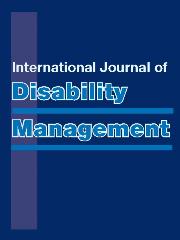Article contents
Raising Awareness and Appreciation: Employee Perspectives on Disability Management in Swiss Companies
Published online by Cambridge University Press: 06 May 2019
Abstract
In Western countries, an increasing number of companies has difficulties with recruiting and retaining employees, along with growing employer responsibilities in the workplace. Therefore, companies’ interest in disability management programs has increased. This article examines employee perspectives of disability management and how it is related to job satisfaction, physical and mental health, workplace morale and sickness absence. Employees from seven Swiss companies (N=482), from the private and public sector, participated in either an online and paper-and-pencil survey for this present study. The survey asked employees to report their views of how disability management is related to job satisfaction, mental health, physical health, workplace morale and absenteeism. The Swiss employees participating in the study knew about disability management and related programs, which are implemented in their company. They valued them as moderately helpful for a variety of factors related to workplace wellbeing, and regarded the programs generally as high quality and wanted them to continue, because they contribute to job satisfaction, mental health, physical health, workplace morale and reduced sickness absence. However, employees also saw more value in disability prevention (DP) and stay at work (SAW) programs than in return to work (RTW) programs. Male employees and those working for public organisations saw more benefit in disability management programs than female employees and those working in the private sector.
- Type
- Article
- Information
- Copyright
- © The Author(s) 2019
References
- 2
- Cited by


